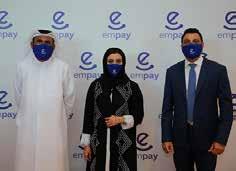
19 minute read
NEWS
CONTACTLESS PAYMENT ECOSYSTEM EMPAY LAUNCHES IN DUBAI
The Emirates Payment Services has announced the launch of Empay, the world’s first contactless instant credit lifestyle payment ecosystem. Empay, designed and developed within the UAE’s Smart Government program framework, is a payment application for secure and cashless transactions.
Advertisement
Empay is also the region’s first national contactless mobile payment app developed for the UAE residents AVAYA TO MAKE EVERY EXPERIENCE MATTER AT GITEX 2020 Avaya has announced its participation at the 2020 edition of GITEX Technology Week, where the company will demonstrate solutions that address post-pandemic business challenges and prepare organisations for the new world of work.
Avaya’s presence at GITEX Technology Week, the only in-person global technology exhibition of 2020, will be supplemented with a large footprint on GITEX Unlimited, a digital platform that enables remote visitors to experience the event from the comfort of their homes and offices.
Under the theme ‘Every Experience Matters’, the technologies on display are based on Avaya’s multi-cloud application ecosystem that delivers effortless, seamless, and context-driven experiences across all touchpoints for customers and the employees who serve them.
“The world is very much adapting from all walks of life. Empay provides multiple payment modes for people to use as per their convenience and lifestyle requirements. Empay is a culmination of government and private sector service payments including a wide variety of payments and lifestyle services such as Dubai Economic Department License Renewal, all types of bill payments, food ordering from restaurants, education fee payments, international remittance, P2P (Peer-to peer) micro payments and much more.
UAE residents can download the free super app from the Google Play Store or iOS App Store and register in just two minutes, and avail a Mastercard powered digital card within the app. The next-gen mobile solution is set to revolutionise customer experience by enabling them to conduct their financial transactions in a simple, fast, smart,
and secure way. to new business models – a fact made obvious by GITEX Technology Week’s decision to adopt a hybrid approach for its 2020 edition. COVID-19 has accelerated digital transformation by several years, and amid that shift, it’s become clear that increased focus needs to be placed on delivering incredible experiences across every touchpoint. We’ll be at GITEX to demonstrate how every experience matters, felt by a customer or employee and whether it’s online or in-person. And that prioritizing those experiences is the key to business success in the new future of work,” said Nidal Abou-Ltaif, President, Avaya International.

MORE THAN 1 BILLION PEOPLE TO HAVE 5G COVERAGE BY 2020 END: REPORT
Ericsson projects that four out of every ten mobile subscriptions in 2026 will be 5G. This forecast is included in the latest edition of the Ericsson Mobility Report. Current 5G uptake in subscriptions and population coverage confirms the technology as deploying the fastest of any generation of mobile connectivity.
The report estimates that by the end of 2020, more than 1 billion people – 15 percent of the world’s population – will live in an area that has 5G coverage rolled out. In 2026, 60 percent of the world’s population will have access to 5G coverage, with 5G subscriptions forecast to reach 3.5 billion.
Ericsson has raised its yearend 2020 estimate for global 5G subscriptions to 220 million, as service providers continue to build out their networks. The increase is largely due to fast uptake in China, reaching 11 percent of its mobile subscription base. This is driven by a national strategic focus, intense competition between service providers, as well as increasingly affordable 5G smartphones from several vendors.
North America is expected to end the year with around 4 percent of its mobile subscriptions being 5G. Commercialization is now moving at a rapid pace and by 2026, Ericsson forecasts that 80 percent of North American mobile subscriptions will be 5G, the highest level of any region in the world.
Europe will end the year with around one percent 5G subscriptions in the region. During the year, a number of countries have delayed their auctions of the radio spectrum needed to support 5G deployment.
DU POWERS DUBAI CIVIL DEFENSE WITH BLOCKCHAIN
du, from Emirates Integrated Telecommunications Company (EITC), has announced a significant strategic partnership with Dubai Civil Defense to automate business processes, data exchange and full payments settlement in addition of the integration with unified business registry network for all free zones in the UAE. The collaborative partnership will see the two parties take full advantage of the readymade Blockchain Edge platform and contribute to the vision of H.H. Sheikh Mohammed bin Rashid Al Maktoum, Prime Minister and Vice President of the UAE and Ruler of Dubai, to ensure Dubai our commitment to support the UAE agreement, and with the availability of becomes the happiest city in the world. government departments to deliver the platform through du Blockchain du Blockchain Edge provides seamless sustained success by taking full Edge, we are one step closer to digital experiences and solutions, advantage of burgeoning blockchain realising our leadership’s vision guaranteeing scalability and empowering technology. Dubai Civil Defense is for smart government that adopts individuals, enterprises, and government dedicated to serving Dubai residents advanced technologies to enhance entities to contribute to the UAE’s and empowering a better quality of life efficiencies for a happier, smarter, knowledge-based journey which supports for all and we welcome the enrichments and more digitally-enabled Dubai. the UAE Blockchain Strategy 2021, as well to the UAE’s digital transformation We are confident that this project as the Dubai Paperless Strategy. expected to come as a direct result of will consolidate Dubai’s reputation
Farid Faraidooni, Chief New Business this collaboration.” as a global smart economy leader and Innovation Officer, du, said, Jamal Al Mahiri, Brigadier at Dubai in line with UAE government digital “Today’s agreement will strengthen Civil Defense said, “With today’s transformation strategy .”
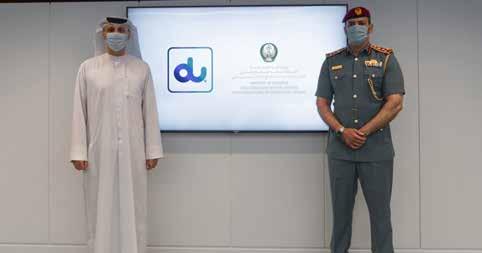
CARDING AND DATA LEAKAGE ON THE RISE IN THE MIDDLE EAST: HELP AG
As virtual footprints of organisations have continued to expand multi-fold during the coronavirus pandemic, instances of carding, data exposure, and hacktivism have escalated to become the highest rated digital risk categories in 2020, impacting almost all major industry verticals in the Middle East region, the first ever Digital Risk Protection report by Help AG, the cyber security arm of Etisalat Digital, has revealed.
Help AG’s security analysts saw a 500% jump in risk alerts for carding from January to June 2020 compared to the same period in 2019. Carding refers to the trafficking of credit cards, bank accounts, and other personal information online. During the initial months of COVID-19, Help AG’s security analysts also witnessed a staggering 3X (183%) jump in threat alerts related to data exposure.
Another key finding is a nearly 50% increase in hacktivism risk alerts following analysis of monitored hacker groups’ advertisements on social networks (hacktivist profiles and groups), media (local, sectorial, and syndicalist), petition and signature platforms, information sharing platforms and manifestos (pastes). Hacktivism is an open challenge among cybercriminals to take down a normal business by causing disruption. The top impacted sectors include healthcare, government, aviation, logistics, retail, and energy and utilities.
“The impact of the pandemic is very clear as we compare risk alerts with the corresponding number of alerts in 2019 in our first ever Digital Risk Protection report,” Stephan Berner, Chief Executive Officer at Help AG, said.
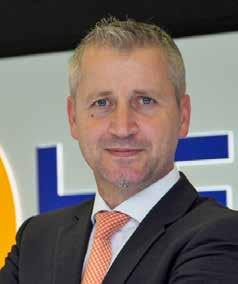
DIFC FINTECH HIVE SIGNS PACT WITH FINTECH-AVIV
DIFC FinTech Hive, part of Dubai International Financial Centre (DIFC), has signed a landmark agreement with
Israel’s FinTech-Aviv. FinTech Aviv was established in 2014 and serves the needs of the Israeli
FinTech ecosystem and counts more than 6,000 startups and 300 research and development centres as members. The agreement is the first of its kind for the UAE and Israel, and strengthens
DIFC’s position as MEASA’s number AMAZON DOUBLES DOWN ON INVESTMENTS IN THE UAE Amazon announced that it has invested in strengthening its operations in the UAE to ensure a smarter, faster, and more consistent experience for its customers and sellers. Spread across three key pillars: delivery infrastructure, job creation, and technology, the capital investments are well-timed for peak shopping season.
Amazon increased its storage capacity by over 45% across its fulfillment network and opened a state-of-the-art new delivery station in the UAE, creating more than 2,000 permanent and seasonal jobs. The company now has more than 2.4 million cubic feet of storage capacity across its network and third-party partners. one FinTech hub and one of the world’s top 10 FinTech hubs. The agreement announced today will enable DIFC to further support the UAE in facilitating economic growth from the technology and innovation sectors. Both parties will work together on events, knowledge sharing, talent development and facilitating mutual introductions and referrals for firms keen to expand in each respective jurisdictions. The agreement follows the signing of the Abraham Accords Peace Agreement: Treaty of Peace, Diplomatic Relations and Full Normalisation between the United Arab Emirates and the State of Israel on 15 September 2020.
Since DIFC’s FinTech Hive launched in January 2017, the hub has grown to become a leading centre of innovation globally. More than 50 per cent of all FinTech businesses in the GCC now
Amazon is leveraging its 20+ years of global technology innovation to create more efficient processes for customers and associates in the UAE. Global technologies seamlessly enhance the delivery process from sort centers and delivery stations to associate journeys, resulting in a smooth customer experience. These best in class tools help create a safe and efficient work environment for associates. For example, Amazon’s advanced logistics systems and operate from DIFC. The first half of 2020 witnessed DIFC FinTech Hive triple in size with the opening of a larger space in Gate Avenue supporting startups, scale-ups and entrepreneurs. Raja Al Mazrouei, Executive Vice President of DIFC FinTech Hive said: “Like Dubai, Israel is well regarded for its approach to innovation and embracing FinTech so it is important to collaborate now to share knowledge and develop the sector further. We are pleased to have partnered with FinTechAviv as we can achieve great things together. DIFC is now home to more than 240 FinTech related firms and the opportunities for growth are endless.” Nir Netzer, the Chairman of FinTechAviv said: “In this unprecedented time of reaching out to promote peace in the middle east, we’re honored to initiate this unique collaboration in order to facilitate the export of Israeli
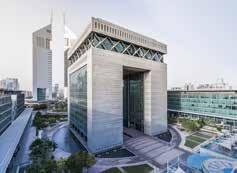
technologies to new markets. technology delivery app helps drivers optimize their delivery route providing a seamless road experience. Prashant Saran, Director of Operations for Amazon Middle East and North Africa (MENA), said, “Amazon’s investment in strengthening operations reflects our long-term commitment to delivering a world-class customer experience for our customers and partners in the UAE. We feel a deep responsibility to the communities where we operate, and the creation of thousands of new jobs will benefit the entire country. Our goal is to ensure that customers across the country are able to get what they want from the comfort of their home while prioritising the health and safety of our associates, partners, and customers.”

ETISALAT TAKES MAJOR LEAP TOWARDS AUTONOMOUS NETWORK
Etisalat has deployed the first end-to-end multi-vendor DWDM Transport network orchestration in the Europe, Middle East and Africa (EMEA) region with software from Blue Planet, a division of Ciena, forging a path to create one of the world’s most adaptive and self-optimising networks. Blue Planet’s intelligent automation software supports in accelerating Etisalat’s digital transformation journey in line with UAE’s vision to create a more competitive digital economy. Haitham Abdulrazzak, Chief Technology Officer, Etisalat, said, “Etisalat as a global leader in many technologies and innovations continuously aims to enhance its leadership, position, network efficiency and provide superior customer experience, and a ‘zero-touch network target’ is a tool to achieve this. Transport network is in the heart of all autonomous networks, and the deployment of Blue Planet solution is a major step in our strategy to create more agile on demand adaptive networks.”
The Blue Planet software has been designed to support Etisalat’s specific intelligent automation requirements and has been implemented in close collaboration with Etisalat.
By reducing manual operations and automating order-to-service processes, Blue Planet supports Etisalat to further reduce the time it takes to introduce new services by 70 to 90 percent. This efficiency is achieved via the Blue Planet Multi Domain Service Orchestration (MDSO) at the Transport DWDM Network level, which is integrated with Etisalat’s existing OSS inventory and automation systems to execute closed loop automation. Blue Planet also provides automated fiber diversity by integrating with a GIS system, while orchestrating service provisioning across the multi-vendor and multi-domain WDM network.

AVEVA LAUNCHES TEAMWORK
AVEVA has announced the launch of the new AVEVA Teamwork, a fully integrated cloud-based application built specifically for industrial workers to facilitate continuous learning and improvement. It is designed to connect plant workforces with core digital systems and unlock visibility into operations. Whether providing training videos, digital logbook or answering a call for help AVEVA Teamwork will help solve many of the challenges associated with traditional training and knowledge transfer methods which can consume weeks and even months to get frontline workers up to speed on the essential skills needed to run today’s complex industrial operations.
AVEVA has partnered with Poka, the most comprehensive connected worker platform, to bring the AVEVA Teamwork application to market. It will offer the connected worker a more integrated experience within the larger AVEVA Connect, cloud platform.
With the AVEVA Teamwork application, plant workers will be able to use tablets to scan QR codes strategically placed throughout the plant, giving them instant access to standard work instructions, troubleshooting solutions, equipment KPIs and more. They will also be able to
Micro Focus has appointed Anas
Jwaied to the role of Vice President and General Manager for Emerging
Markets. The region constitutes a conglomerate of over 70 countries spanning Middle East & Africa (MEA),
Central & Eastern Europe (CEE),
Israel, Russia, and Brazil. Jwaied’s appointment to the position comes after a four-year successful tenure as
Managing Director for the MEA region at Micro Focus. “It is my honour and privilege to continue my work with Micro
Focus as the new Vice President and General Manager for Emerging
Markets. I am excited to work with a team that has seen such unbridled success in the region, and I am eager to support our partners and customers as they progress in their post important production updates and send out calls for assistance in the form of text, photos or videos to communicate with one another in real-time to resolve issues and identify improvements directly from their daily routines.
“AVEVA Teamwork brings yet another cloud inspired innovation to our growing software portfolio which will enable organisations to capture experienced worker knowledge and create sustainable video-based learning content, thereby reducing training time and costs for new operators by up to 50%,” said Rashesh Mody, Senior Vice President, Monitoring And Control Business Unit, AVEVA. “Industrial workers will now have the benefit of being able to learn continuously, on-the-job, while also contributing to collective knowledge and best practices, and likewise industrial organisations also now have the knowledge and tools they need to drive continuous improvement in productivity, waste,
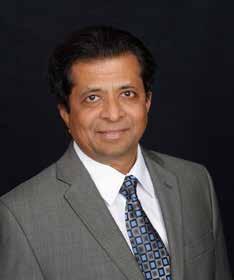
MICRO FOCUS APPOINTS NEW REGIONAL LEADERSHIP IN EMERGING MARKETS
quality and safety.” digital transformation journeys through these times of the new normal,” said Jwaied.
Jwaied brings over 25 years of experience in leadership positions and has managed diverse teams across Europe, Middle East and Africa (EMEA) within the technology sector. Having held prior executive positions at Hewlett Packard and Hewlett Packard Enterprise, he transitioned with the 2016 spin merger (of HPE and Micro Focus) to the role of Managing Director for Micro Focus MEA.
Throughout his career, Jwaied has supported an array of corporate enterprises, commercial, small, and medium businesses in their digital transformation efforts. He has developed a particular interest and in-depth knowledge of Go-ToMarket strategies, including planning, and driving medium and long-term sustainable growth plans.


CHARTING NEW WATERS
VINAY SHARMA, GROUP IT DIRECTOR, GULFTAINER, EXPLAINS HOW THE GLOBAL PORT AND SHIPPING OPERATOR SPEARHEADS INNOVATION THROUGH DIGITAL TECHNOLOGIES TO CREATE COMPETITIVE ADVANTAGE AND ENHANCE CUSTOMER EXPERIENCES.
Organisations across different industries are increasingly adopting digital transformation technologies to leverage the numerous benefits they bring to the table as well as to stay ahead of the game in the technology- and cloud-led era. Digital transformation is becoming a mandate at management levels in verticals, such as the maritime transport industry. Port management, shipping, and logistics companies are exploring innovative ways to enhance supply chains and automate overall operations through emerging and advanced technologies.
Established in 1976, Gulftainer, an independently owned UAE-headquartered global port operator, manages 15 ports and logistics in six countries around the world. Understanding the importance of digital technologies to gain a competitive edge as well as for business continuity, Gulftainer had begun its digital transformation journey over the past few years. Today the company has a well-sketched plan for adopting digital solutions across the organisation.
“We have a three-staged transformation strategy,” explains Vinay Sharma, Group IT Director, Gulftainer. “In the first stage, we had focused on standardization and consolidating our core systems and infrastructures, to lay robust platforms for taking digital transformations to the next levels.”
To illustrate further, the port operator has implemented SAP S4 HANA as the core ERP system, a state-of-the-art Terminal Operating System (TOS), and a number of off-the-shelf solutions in its operational areas by adopting industry best-practices and processes.
“As part of our strategy, we have set up global models for quick deployment to our global operation in an agile way,” says Sharma. “In the second phase, we are executing a pipeline of initiatives focused on creating differentiators, which then leads us into the next phase where we create innovations and out-of-the-box solutions to establish excellence in various aspects of our operations.”
According to Vinay, with customer expectations evolving at a fast pace, it is important for companies such as Gultainer to deliver its services not only in cost-effective manners but also innovatively, ensuring there is a genuine value-add. Fortunately, the company anticipated the changing market trends and designed a plan to offer its customer true digital innovation and go beyond just ticking boxes.
“Digital transformation is not just about deploying new technologies but also about creating value for both internal and external stakeholders,” adds Sharma. “Like other industries, ports and logistics vertical is transforming into a more integrated supply chain mode providing end-to-end services. At Gultainer, technology innovations to meet customer expectations, real-time information, and ease of doing business are key priorities for us.”
The beginning of this year brought on unexpected challenges in the form of a global pandemic. Supply chain issues and delays, safety hazards, maintenance challenges, and so on were some of the critical areas that port management companies had to address urgently during the COVID-19 lockdowns and subsequent consequences.

BETTING ON THE FUTURE
The technologies Gulftainer is investing in are:
1. Artificial Intelligence (AI) and Autonomous Drones
Gulftainer aims to fully automate operations and utilise predicted analysis including autonomous inspections and drone-based deliveries.
2. Internet of Things (IoT) and Robo-Doctors
Gulftainer aims to focus on autonomous monitoring of critical equipment using IoT and smart sensing technology to reduce maintenance costs and downtime and invest in automated ‘Rob- doctors’ to detect and fix anomalies at greater speed and accuracy.
3. Big Data & Advanced Analytics
The company will use predictive analysis on historical/real-time data using AI, ML to eliminate supply chain inefficiencies/ bottlenecks. It will also apply simulation / emulations/ What-If-Analysis/ scenarios based planning and real-time digital boardroom for informed decisions.
4. Blockchain Solutions
The port operator will optimise blockchain technology as it will revolutionise data exchange processes and drastically reduce shipping transit time/ cost with higher transparency.
5. Idea Forum – Bring Your Own Idea
Gulftainer has introduced an open track that will offer the opportunity to startups to incorporate out-of-the-box ideas to disrupt ports, logistics and global trade industry.
“This mandated us to refine our strategy. We undertook new initiatives for this year and formulated a sound digital transformation strategy till 2025 with a core focus on sustainable innovations,” explains Sharma. “For us, employees’ safety and customer services are paramount in operating efficiently during this pandemic time.”
Gulftainer has enabled work-fromhome models for most of its office staff and enhanced safety procedures for its terminal staff to ensure employees are presented with safe working environments.
“For our customers, we have launched new e-services to prioritise the delivery of consignments, actively encouraging them to use new secured digital channels that promote remote transactions and support COVID-19 safety measures undertaken by the government.”
With the company finding itself in the third phase of its digital transformation strategy and focusing on sustainable innovations, Gulftainer has introduced a ‘The Future of Ports Challenge’ in association with Silicon Valley company OneValley.
“Staying ahead in the adoption of technology is the key driver for any business. ‘The Future of Ports Challenge’ aims to identify pathbreaking, highly disruptive technologies that could redefine the supply chain and logistics industry. Our partner for this program OneValley, is helping us to identify innovative solution providers,” says Sharma.
Through this initiative, Gulftainer aims to discover innovative solutions around IoT, machine learning, drones, blockchain, Big Data, and analytics to future proof its business.
Sharma adds. “We want to spearhead the next phase of innovations in our industry through this initiative. We will explore how these technologies can be applied to our ports and enhance our service delivery. RPA is also one of the key areas that we have identified that can tremendously help us automate our core functions to enhance customer experiences.”
Over the course of next year, we will see the global port operator scaling its business to new levels and strengthening its supply chain process, including warehousing, transportation, freight forwarding and other components.
Gulftainer will also be introducing innovation programs internally within the firm in the new year. Towards this, the company has formed an innovation board to drive idea-sharing and entrepreneur culture across the organisation.
“This will give competitive advantages to Gulftainer in the way we operate and provide services to our customers. It will also create opportunities for new revenue streams and innovative services,” explains Sharma. “It also needs to be a cultural transformation when we are accelerating our digital goals. It is important to involve employees from bottom up to get different ideas and also reward them in some form or the other. We will also add external industry thought leader to the team. This will help us to be proactive rather than reactive in terms of learning and knowing markets trends and latest technologies.”
As part of the senior management at Gulftainer, Sharma says that the C-level executives of the company understand that technology is the key driver for the business.
“This enables us to deliver integrated services in a cost-effective, transparent, and reliable manner. We are well ahead in understanding the importance of digital transformation and have embarked upon various initiatives to create differentiators within the industry and to ensure business continuity in the years to come,” he concludes.”










